英语七年级下册 Unit 7 It's raining! Section A(1a-2d)课件(共有PPT60张,含音频)
文档属性
| 名称 | 英语七年级下册 Unit 7 It's raining! Section A(1a-2d)课件(共有PPT60张,含音频) | 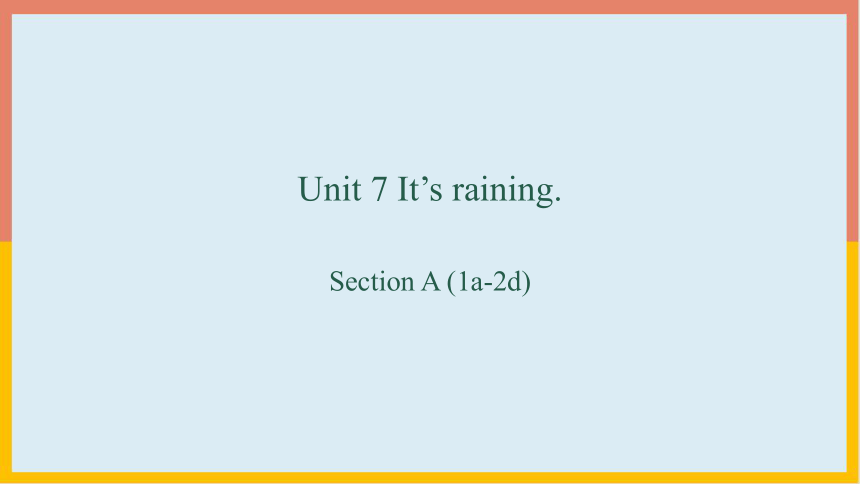 | |
| 格式 | zip | ||
| 文件大小 | 6.0MB | ||
| 资源类型 | 教案 | ||
| 版本资源 | 人教新目标(Go for it)版 | ||
| 科目 | 英语 | ||
| 更新时间 | 2022-01-01 19:23:46 | ||
图片预览

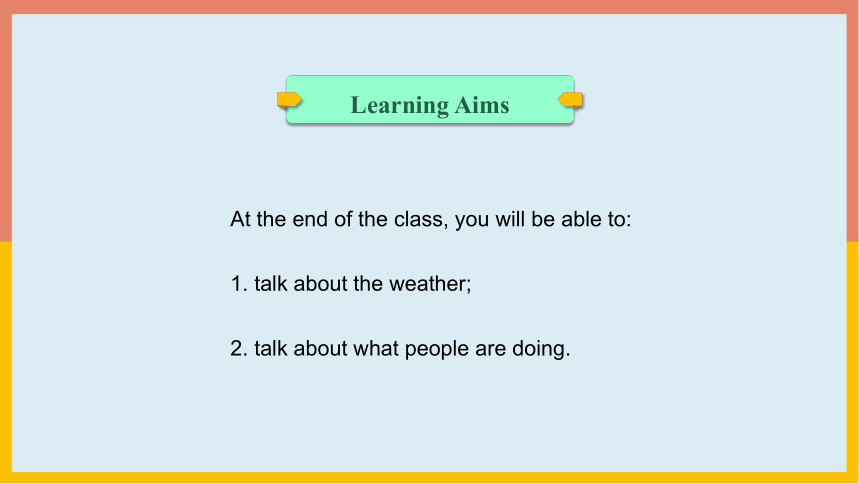
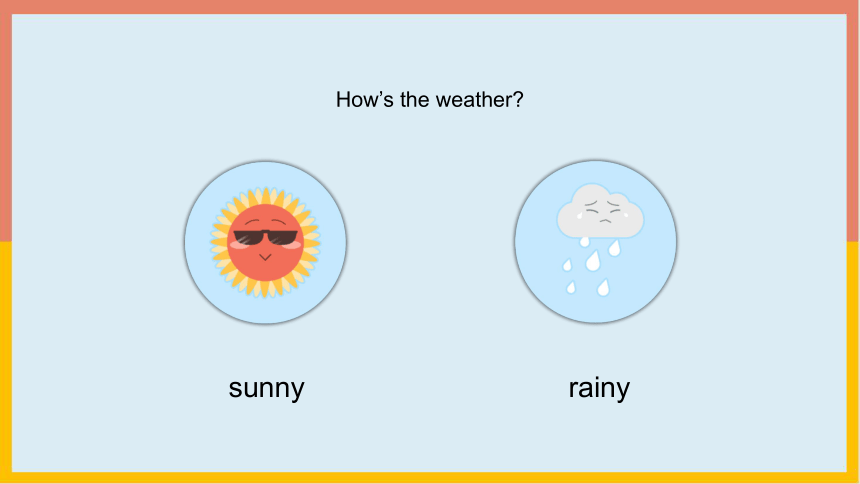
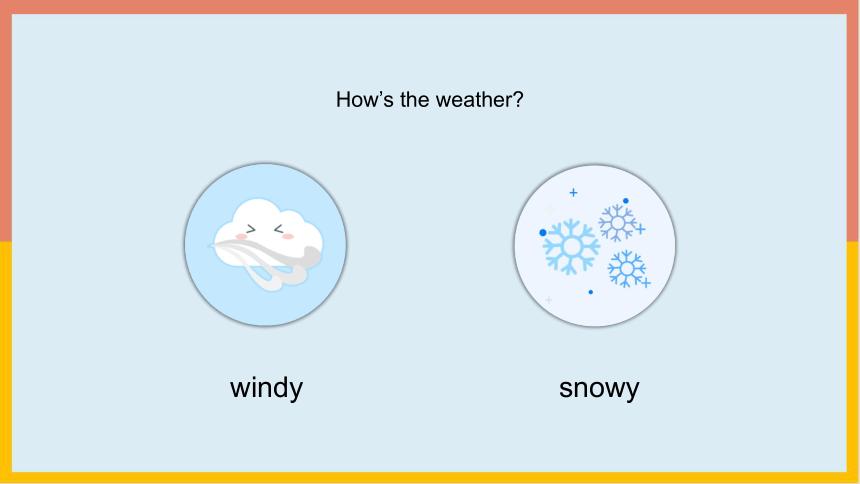
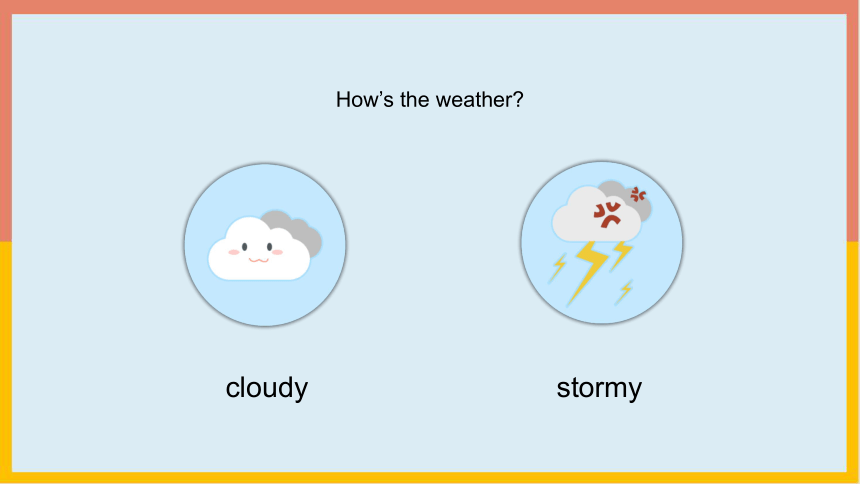
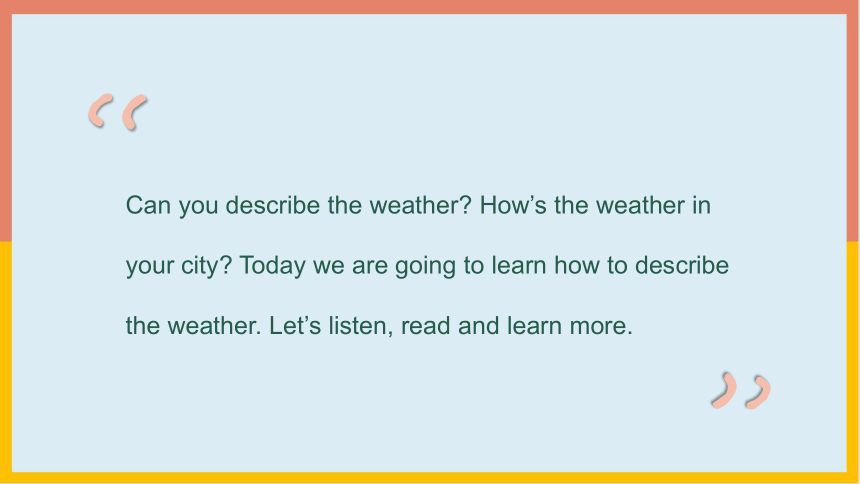
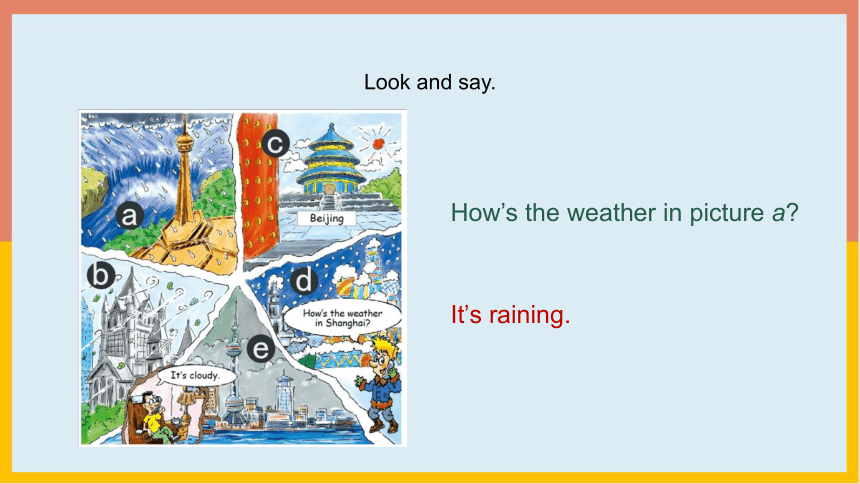
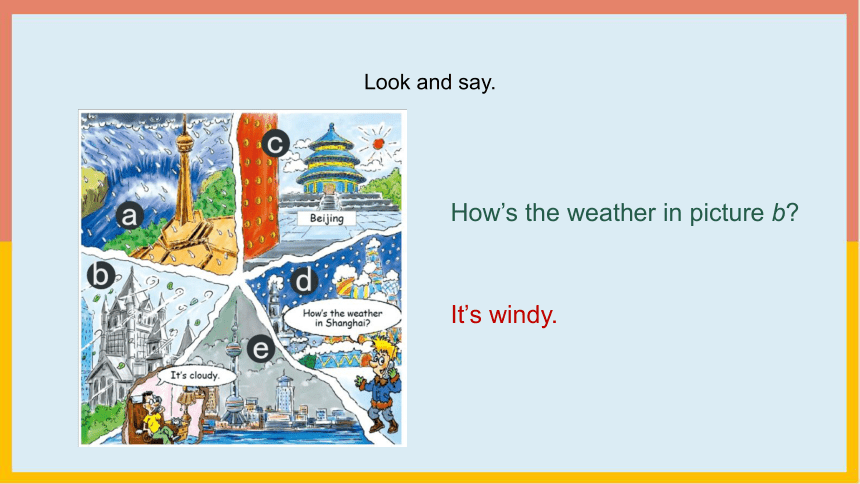
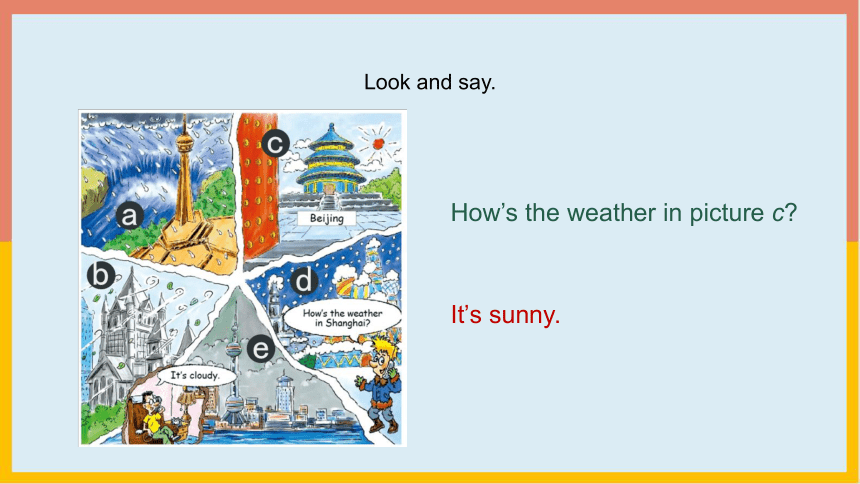
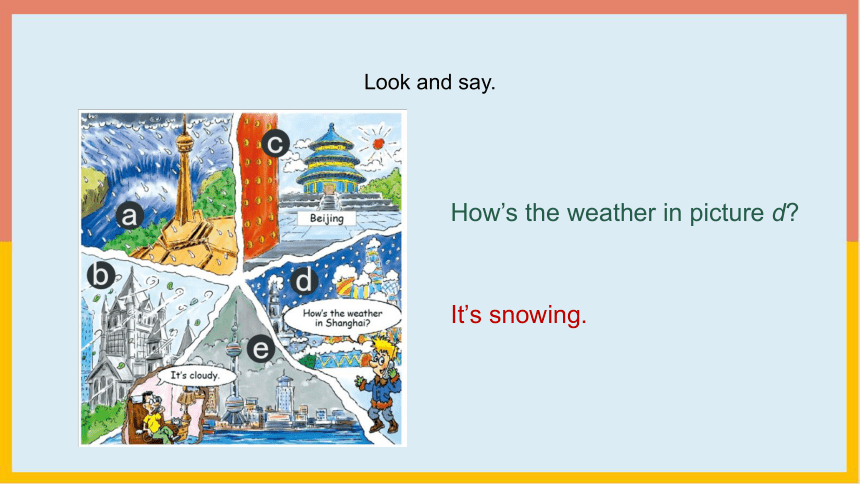
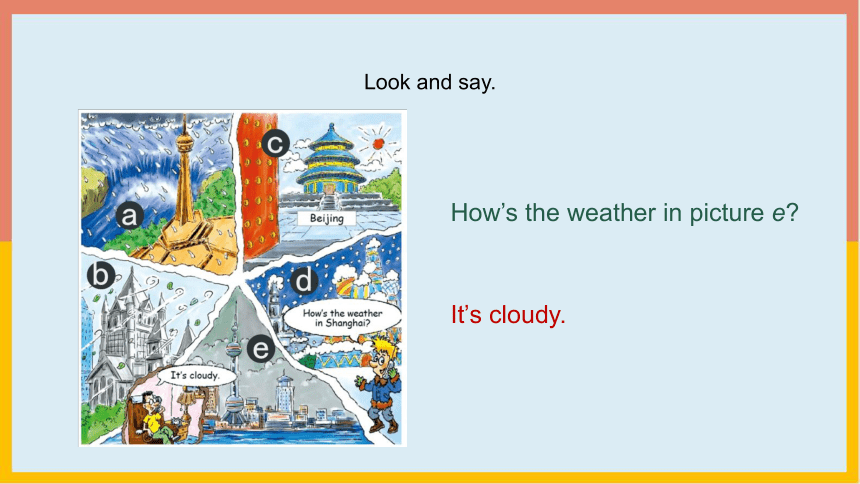
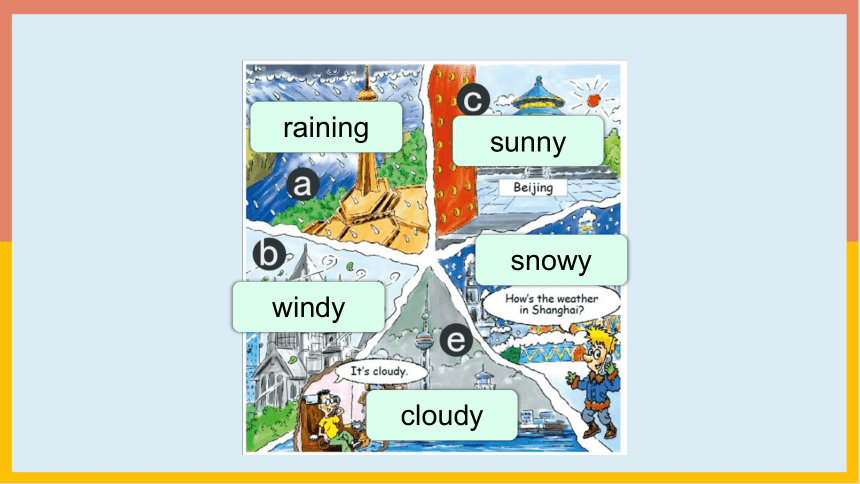
文档简介
(共60张PPT)
Unit 7 It’s raining.
Section A (1a-2d)
Learning Aims
At the end of the class, you will be able to:
1. talk about the weather;
2. talk about what people are doing.
How’s the weather
sunny
rainy
How’s the weather
windy
snowy
How’s the weather
cloudy
stormy
Can you describe the weather How’s the weather in your city Today we are going to learn how to describe the weather. Let’s listen, read and learn more.
“
“
Look and say.
How’s the weather in picture a
It’s raining.
How’s the weather in picture b
It’s windy.
Look and say.
How’s the weather in picture c
It’s sunny.
Look and say.
How’s the weather in picture d
It’s snowing.
Look and say.
How’s the weather in picture e
It’s cloudy.
Look and say.
raining
windy
sunny
snowy
cloudy
Toronto
Moscow
Listen and match these city names with the pictures.
Beijing
Boston
Shanghai
Let’s make conversations.
A: How’s the weather in Beijing
B: It’s sunny.
Let’s make conversations.
A: How’s the weather in Toronto
B: It’s raining.
Let’s make conversations.
A: How’s the weather in Boston
B: It’s windy.
Let’s make conversations.
A: How’s the weather in Shanghai
B: It’s cloudy.
Let’s make conversations.
A: How’s the weather in Moscow
B: It’s snowing.
raining 下雨
rain此处作动词,意为“下雨”。
e.g.
It often rains here in August every year.
rain 的其他用法:
1.rain还可作名词,意为“雨;雨水”。
e.g. The river runs really quickly after the heavy rain.
2.rain的形容词形式为rainy,意为“阴雨的;多雨的”。
e.g. What do you usually do on rainy days
【注意】在表示雨的大小程度时,用hard/heavy/light修饰,不用big/small等,如a heavy rain一场大雨。
windy 多风的
windy形容词,意为“多风的;有风的”。windy是由名词wind在词尾加-y变成的形容词。
e.g.
Put on your warm clothes. It’s windy and cold outside.
穿上你暖和的衣服,外面有风很冷。
符合“名词+-y→形容词”构词法的其他表示天气的词:
cloud(云)+y→cloudy(多云的)
rain(雨)+y→rainy(多雨)
snow(雪)+y→snowy(多雪的)
sun(太阳)+y→sunny(晴朗的)
sand(沙)+y→sandy(多沙的)
How’s the weather in Beijing
北京的天气怎么样
How’s the weather 是用来询问天气状况的常用句型,与What’s the weather like 同义,在句末可以加上“介词+地点/时间”等短语作状语。回答时常用it来指代“天气”和“气候”。
e.g.
—How’s the weather in Hangzhou =What’s the weather like in Hangzhou
—It’s cloudy.
How’s the weather in Beijing
北京的天气怎么样
weather不可数名词,意为“天气”,不能与不定冠词a(n)连用。
e.g.
What fine weather!
Jim and Linda are talking on the phone. What is Linda’s family doing Let’s look, listen and learn more.
“
“
What’s Linda’s family doing
Jim
is calling
What’s Linda’s family doing
Jim
is calling
cooking
talking on the phone
watching TV
playing computer games
playing basketball
Listen and match the people with the pictures.
Linda
Aunt Sally
Mary
Jeff
Uncle Joe
Listen and number the pictures [1-4].
1
2
3
4
is talking on the phone.
is playing computer games.
is playing basketball.
is watching TV.
is cooking.
Listen again and write down people’s activities.
Linda
Aunt Sally
Mary
Jeff
Uncle Joe
Let’s make conversations.
A: What’s Aunt Sally doing
B: She is cooking.
Let’s make conversations.
A: What’s Jeff doing
B: He is playing computer games.
Let’s make conversations.
A: What’s Mary doing
B: She is watching TV.
Let’s make conversations.
A: What’s Uncle Joe doing
B: He is playing basketball.
...is cooking.
正在做饭。
cook此处作动词,意为“做饭”。
常用搭配为:cook sb. sth. /cook sth. for sb. 为某人烹饪某物
e.g.
She often cooks lunch for us.
1.cook还可作名词,意为“厨师”。
e.g.
Her father is a good cook.
2.cook+er→cooker意为“厨具;厨灶”。
e.g.
The cooker is very expensive.
cook
cooker
Read the conversation and answer the questions.
How is the weather
What is Steve doing
What is Rick’s brother doing
What does Steve want Rick to do
Read the conversation.
Rick: Hello, Rick speaking.
Steve: Hi, Rick. It’s Steve. How’s it going
Rick: Not bad, thanks. The weather’s great. What are you doing
Steve: I am playing basketball with some friends at the park.
Rick: Sounds like you’re having a good time.
Steve: Yeah. Is your brother at home
Rick: Oh, he’s not here. He’s studying at his friend’s home.
Can I take a message for him
Steve: Yes. Could you just tell him to call me back
Rick: Sure, no problem.
Read the conversation and answer the questions.
How is the weather
What is Steve doing
What is Rick’s brother doing
What does Steve want Rick to do
The weather is great.
He’s playing basketball with some friends at the park.
He’s studying at his friend’s home.
He wants Rick to tell his brother to call him back.
How’s it going
近况如何
How’s it going 意为“近况如何 ”或“一切都好吗 ”是表达对朋友、家人问候或关怀的常用语。
主语it可指代问话人所关心的任何事情。
=How’s everything going
回答How’s it going 的常见答语:
Great! 好极了!
Wonderful! 棒极了!
Pretty good! 相当好!
Everything is OK. 一切都很好。
Everything goes well. 一切顺利。
Just so so. 马马虎虎。
Not bad. 还不错。
Sounds like you’re having a good time.
听起来你玩得很开心。
本句中sounds前省略了主语it。sound此处为连系动词,意为“听起来”,like为介词。
sound like意为“听起来像……”,后跟名词、代词或表语从句。
e.g.
It sounds like a good idea.
1.sound作连系动词时,其后常跟形容词作表语。
e.g.
Your new job sounds interesting.
2.可构成“连系动词+like”结构的单词有:
look like 看起来像
taste like 尝起来像
feel like 感觉像
smell like 闻起来像
Can I take a message for him
要我给他捎个口信吗
本句为打电话常用语,当接电话人发现对方要找的人不在时,常用此语来表达提供帮助。
e.g.
—Hello May I speak to Alice
—Sorry, she’s out. Can I take a message for her
Can I take a message for him
要我给他捎个口信吗
message可数名词,意为“信息;消息”。
常用搭配:
take a message for sb. 为某人捎个口信;
give sb. a message 给某人捎个口信;
leave a message 留个口信
message, news与information:
message 信息;消息,可数名词,一般指口头传递或书写的消息;
news 消息;新闻,不可数名词,指通过广播、电视、报纸等新闻媒体向大众发布的社会各方面的最新消息;
information 信息,不可数名词,强调各种消息、情报、资料等的具体内容。
Could you just tell him to call me back
你能否叫他给我回个电话
could为情态动词,意为“能;可以”,语气比can更委婉、客气。
“Could you (please) do...
(请问你可以……吗 )”表示有礼貌的请求。
e.g.
Could you please say it again
Could you just tell him to call me back
你能否叫他给我回个电话
back此处为副词,意为“回来,回原处”;
call sb. back 给某人回电话
e.g.
I’ll call you back.
1. back构成的其他动词短语:
take back 拿回,收回
come back 回来
go back 回去
bring back 拿回
2. back用作名词,意为“后面,后部”;用作形容词,意为“后面的”。
e.g.
We are sitting in the back row.
Sure, no problem.
当然可以,没问题。
no problem 意为“没问题;小事一桩”,常用于口语中,表示同意或愉快地答应请求。
e.g.
—Could you lend me your bike
—Sure, no problem.
no problem的其他常见用法:
no problem
用来回答感谢。意为“不用谢;别客气;没什么。”“”
用来回答道歉。意为“没关系;没什么”。
表示有能力做某事。意为“没问题”。
no problem的其他常见用法:
—Thank you very much for your help.
—No problem.没什么。
—I’m sorry to keep you waiting long.
—No problem.没关系。
—Can you help me carry the box
—No problem.没问题。
Sure, no problem.
当然可以,没问题。
problem 可数名词,意为“困难;难题”。
e.g.
If you have a problem, ask Mr Lin for help.
problem与question
problem 常指说话者认为难以解决的问题或用于数学、物理的习题;指困难、麻烦。
常用搭配:
have problems doing sth.做某事有困难
question 指需要作回答的问题,它常与动词ask或answer连用。
e.g.
The math problem is too difficult for them to work out.
The old man has problems hearing and seeing.
Talk about weather:
How’s the weather It’s windy/raining/cloudy/snowing/sunny.
Talk about what are people doing
What is … doing
He/She is cooking/watching TV/playing computer games…
根据句意和汉语提示写出所缺的单词
1. They like to talk about the ________(天气).
2. The meat smells _______(坏的). Don’t eat it.
3. There is a large ________(公园) near my home.
4. Can I take a ________(信息) for her She is not at home now.
5. Please tell me how to solve the ________(问题).
weather
bad
park
message
problem
单项选择
( )1.The in Shanghai is hot and wet in summer.
A. problem B. weather C. message D. mountain
( )2.—We’re playing games in the park now.
— like you’re having a good time.
A. Smells B. Tastes C. Feels D. Sounds
( )3. The air pollution is a serious in our country. Our government is trying to solve it.
A. choice B. program C. problem D. opinion
B
D
C
单项选择
( )4.—Will you carry the box for me, please
—Sure, .
A. no good B. no problem C. no idea D. no way
( )5.—How’s it going, Alan
— .
A. Long time no see. B. I’m drawing pictures.
C. It’s going to rain. D. Pretty good.
B
D
根据汉语意思完成句子
1. ——北京的天气怎么样 ——晴朗。
—________ the weather in Beijing —________ sunny.
2. ——你近况如何 ——不坏。
—________ ________ ________ with you —Not bad.
3. 听上去像是你过得很愉快。
________ ________ you're ________ a good time.
4. 我可以为他捎个口信吗
________ I ________ a message ________ him
5. 你可以让他给我回电话吗
________ you tell him ________ ________ ________ ________
How’s It’s
How’s it going
Sounds like having
Can take for
Could to call me back
1.Role-play the conversation in 2d.
2.Talk about the weather with your partner.
Unit 7 It’s raining.
Section A (1a-2d)
Learning Aims
At the end of the class, you will be able to:
1. talk about the weather;
2. talk about what people are doing.
How’s the weather
sunny
rainy
How’s the weather
windy
snowy
How’s the weather
cloudy
stormy
Can you describe the weather How’s the weather in your city Today we are going to learn how to describe the weather. Let’s listen, read and learn more.
“
“
Look and say.
How’s the weather in picture a
It’s raining.
How’s the weather in picture b
It’s windy.
Look and say.
How’s the weather in picture c
It’s sunny.
Look and say.
How’s the weather in picture d
It’s snowing.
Look and say.
How’s the weather in picture e
It’s cloudy.
Look and say.
raining
windy
sunny
snowy
cloudy
Toronto
Moscow
Listen and match these city names with the pictures.
Beijing
Boston
Shanghai
Let’s make conversations.
A: How’s the weather in Beijing
B: It’s sunny.
Let’s make conversations.
A: How’s the weather in Toronto
B: It’s raining.
Let’s make conversations.
A: How’s the weather in Boston
B: It’s windy.
Let’s make conversations.
A: How’s the weather in Shanghai
B: It’s cloudy.
Let’s make conversations.
A: How’s the weather in Moscow
B: It’s snowing.
raining 下雨
rain此处作动词,意为“下雨”。
e.g.
It often rains here in August every year.
rain 的其他用法:
1.rain还可作名词,意为“雨;雨水”。
e.g. The river runs really quickly after the heavy rain.
2.rain的形容词形式为rainy,意为“阴雨的;多雨的”。
e.g. What do you usually do on rainy days
【注意】在表示雨的大小程度时,用hard/heavy/light修饰,不用big/small等,如a heavy rain一场大雨。
windy 多风的
windy形容词,意为“多风的;有风的”。windy是由名词wind在词尾加-y变成的形容词。
e.g.
Put on your warm clothes. It’s windy and cold outside.
穿上你暖和的衣服,外面有风很冷。
符合“名词+-y→形容词”构词法的其他表示天气的词:
cloud(云)+y→cloudy(多云的)
rain(雨)+y→rainy(多雨)
snow(雪)+y→snowy(多雪的)
sun(太阳)+y→sunny(晴朗的)
sand(沙)+y→sandy(多沙的)
How’s the weather in Beijing
北京的天气怎么样
How’s the weather 是用来询问天气状况的常用句型,与What’s the weather like 同义,在句末可以加上“介词+地点/时间”等短语作状语。回答时常用it来指代“天气”和“气候”。
e.g.
—How’s the weather in Hangzhou =What’s the weather like in Hangzhou
—It’s cloudy.
How’s the weather in Beijing
北京的天气怎么样
weather不可数名词,意为“天气”,不能与不定冠词a(n)连用。
e.g.
What fine weather!
Jim and Linda are talking on the phone. What is Linda’s family doing Let’s look, listen and learn more.
“
“
What’s Linda’s family doing
Jim
is calling
What’s Linda’s family doing
Jim
is calling
cooking
talking on the phone
watching TV
playing computer games
playing basketball
Listen and match the people with the pictures.
Linda
Aunt Sally
Mary
Jeff
Uncle Joe
Listen and number the pictures [1-4].
1
2
3
4
is talking on the phone.
is playing computer games.
is playing basketball.
is watching TV.
is cooking.
Listen again and write down people’s activities.
Linda
Aunt Sally
Mary
Jeff
Uncle Joe
Let’s make conversations.
A: What’s Aunt Sally doing
B: She is cooking.
Let’s make conversations.
A: What’s Jeff doing
B: He is playing computer games.
Let’s make conversations.
A: What’s Mary doing
B: She is watching TV.
Let’s make conversations.
A: What’s Uncle Joe doing
B: He is playing basketball.
...is cooking.
正在做饭。
cook此处作动词,意为“做饭”。
常用搭配为:cook sb. sth. /cook sth. for sb. 为某人烹饪某物
e.g.
She often cooks lunch for us.
1.cook还可作名词,意为“厨师”。
e.g.
Her father is a good cook.
2.cook+er→cooker意为“厨具;厨灶”。
e.g.
The cooker is very expensive.
cook
cooker
Read the conversation and answer the questions.
How is the weather
What is Steve doing
What is Rick’s brother doing
What does Steve want Rick to do
Read the conversation.
Rick: Hello, Rick speaking.
Steve: Hi, Rick. It’s Steve. How’s it going
Rick: Not bad, thanks. The weather’s great. What are you doing
Steve: I am playing basketball with some friends at the park.
Rick: Sounds like you’re having a good time.
Steve: Yeah. Is your brother at home
Rick: Oh, he’s not here. He’s studying at his friend’s home.
Can I take a message for him
Steve: Yes. Could you just tell him to call me back
Rick: Sure, no problem.
Read the conversation and answer the questions.
How is the weather
What is Steve doing
What is Rick’s brother doing
What does Steve want Rick to do
The weather is great.
He’s playing basketball with some friends at the park.
He’s studying at his friend’s home.
He wants Rick to tell his brother to call him back.
How’s it going
近况如何
How’s it going 意为“近况如何 ”或“一切都好吗 ”是表达对朋友、家人问候或关怀的常用语。
主语it可指代问话人所关心的任何事情。
=How’s everything going
回答How’s it going 的常见答语:
Great! 好极了!
Wonderful! 棒极了!
Pretty good! 相当好!
Everything is OK. 一切都很好。
Everything goes well. 一切顺利。
Just so so. 马马虎虎。
Not bad. 还不错。
Sounds like you’re having a good time.
听起来你玩得很开心。
本句中sounds前省略了主语it。sound此处为连系动词,意为“听起来”,like为介词。
sound like意为“听起来像……”,后跟名词、代词或表语从句。
e.g.
It sounds like a good idea.
1.sound作连系动词时,其后常跟形容词作表语。
e.g.
Your new job sounds interesting.
2.可构成“连系动词+like”结构的单词有:
look like 看起来像
taste like 尝起来像
feel like 感觉像
smell like 闻起来像
Can I take a message for him
要我给他捎个口信吗
本句为打电话常用语,当接电话人发现对方要找的人不在时,常用此语来表达提供帮助。
e.g.
—Hello May I speak to Alice
—Sorry, she’s out. Can I take a message for her
Can I take a message for him
要我给他捎个口信吗
message可数名词,意为“信息;消息”。
常用搭配:
take a message for sb. 为某人捎个口信;
give sb. a message 给某人捎个口信;
leave a message 留个口信
message, news与information:
message 信息;消息,可数名词,一般指口头传递或书写的消息;
news 消息;新闻,不可数名词,指通过广播、电视、报纸等新闻媒体向大众发布的社会各方面的最新消息;
information 信息,不可数名词,强调各种消息、情报、资料等的具体内容。
Could you just tell him to call me back
你能否叫他给我回个电话
could为情态动词,意为“能;可以”,语气比can更委婉、客气。
“Could you (please) do...
(请问你可以……吗 )”表示有礼貌的请求。
e.g.
Could you please say it again
Could you just tell him to call me back
你能否叫他给我回个电话
back此处为副词,意为“回来,回原处”;
call sb. back 给某人回电话
e.g.
I’ll call you back.
1. back构成的其他动词短语:
take back 拿回,收回
come back 回来
go back 回去
bring back 拿回
2. back用作名词,意为“后面,后部”;用作形容词,意为“后面的”。
e.g.
We are sitting in the back row.
Sure, no problem.
当然可以,没问题。
no problem 意为“没问题;小事一桩”,常用于口语中,表示同意或愉快地答应请求。
e.g.
—Could you lend me your bike
—Sure, no problem.
no problem的其他常见用法:
no problem
用来回答感谢。意为“不用谢;别客气;没什么。”“”
用来回答道歉。意为“没关系;没什么”。
表示有能力做某事。意为“没问题”。
no problem的其他常见用法:
—Thank you very much for your help.
—No problem.没什么。
—I’m sorry to keep you waiting long.
—No problem.没关系。
—Can you help me carry the box
—No problem.没问题。
Sure, no problem.
当然可以,没问题。
problem 可数名词,意为“困难;难题”。
e.g.
If you have a problem, ask Mr Lin for help.
problem与question
problem 常指说话者认为难以解决的问题或用于数学、物理的习题;指困难、麻烦。
常用搭配:
have problems doing sth.做某事有困难
question 指需要作回答的问题,它常与动词ask或answer连用。
e.g.
The math problem is too difficult for them to work out.
The old man has problems hearing and seeing.
Talk about weather:
How’s the weather It’s windy/raining/cloudy/snowing/sunny.
Talk about what are people doing
What is … doing
He/She is cooking/watching TV/playing computer games…
根据句意和汉语提示写出所缺的单词
1. They like to talk about the ________(天气).
2. The meat smells _______(坏的). Don’t eat it.
3. There is a large ________(公园) near my home.
4. Can I take a ________(信息) for her She is not at home now.
5. Please tell me how to solve the ________(问题).
weather
bad
park
message
problem
单项选择
( )1.The in Shanghai is hot and wet in summer.
A. problem B. weather C. message D. mountain
( )2.—We’re playing games in the park now.
— like you’re having a good time.
A. Smells B. Tastes C. Feels D. Sounds
( )3. The air pollution is a serious in our country. Our government is trying to solve it.
A. choice B. program C. problem D. opinion
B
D
C
单项选择
( )4.—Will you carry the box for me, please
—Sure, .
A. no good B. no problem C. no idea D. no way
( )5.—How’s it going, Alan
— .
A. Long time no see. B. I’m drawing pictures.
C. It’s going to rain. D. Pretty good.
B
D
根据汉语意思完成句子
1. ——北京的天气怎么样 ——晴朗。
—________ the weather in Beijing —________ sunny.
2. ——你近况如何 ——不坏。
—________ ________ ________ with you —Not bad.
3. 听上去像是你过得很愉快。
________ ________ you're ________ a good time.
4. 我可以为他捎个口信吗
________ I ________ a message ________ him
5. 你可以让他给我回电话吗
________ you tell him ________ ________ ________ ________
How’s It’s
How’s it going
Sounds like having
Can take for
Could to call me back
1.Role-play the conversation in 2d.
2.Talk about the weather with your partner.
同课章节目录
- Unit 1 Can you play the guitar?
- Section A
- Section B
- Unit 2 What time do you go to school?
- Section A
- Section B
- Unit 3 How do you get to school?
- Section A
- Section B
- Unit 4 Don't eat in class.
- Section A
- Section B
- Unit 5 Why do you like pandas?
- Section A
- Section B
- Unit 6 I'm watching TV.
- Section A
- Section B
- Review of Units 1-6
- Unit 7 It's raining!
- Section A
- Section B
- Unit 8 Is there a post office near here?
- Section A
- Section B
- Unit 9 What does he look like?
- Section A
- Section B
- Unit 10 I'd like some noodles.
- Section A
- Section B
- Unit 11 How was your school trip?
- Section A
- Section B
- Unit 12 What did you do last weekend?
- Section A
- Section B
